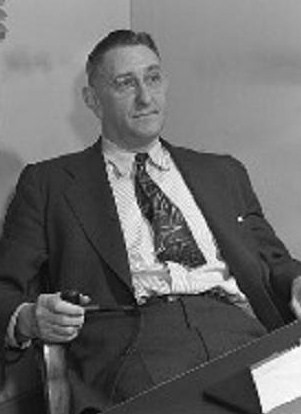
Gerald Gould (1885-1936). Courtesy PoemHunter.
Gerald Louis Gould[1] (1885-1936) was an English poet, essayist, journalist, and reviewer.
Life[]
Gould was brought up in Norwich. He studied at University College London and Magdalen College, Oxford. He had a position at University College, Oxford, from 1906, and was a Fellow of Merton College, Oxford, from 1909 to 1916.[2]
From 1914 he was an official in Masterman's Wellington House Propaganda Department, which may explain his failiure to produce much poetry concerned with the War.[3]
He also worked as a journalist on the Daily Herald as one of 'Lansbury's Lambs' – the group of idealistic young men helping with it after George Lansbury purchased it in 1913, and which included Douglas Cole, W.N. Ewer, Harold Laski, William Mellor, and Francis Meynell. It was probably Gould who brought Siegfried Sassoon to the paper as literary editor after its relaunch in 1919.[4] Gould served as associate editor of the Herald from 1919 to 1921, and was literary editor of Saturday Review from 1922 to 1926.[5]
Gould regularly contributed poetry to the Herald and gave several sonnets to Millicent Fawcett's Common Cause when it became the Woman's Leader in 1920.
Gould also reviewed novels for the New Statesman, moving to The Observer as fiction editor in 1920. He was also (not coincidentally) made chief reader for Victor Gollancz Ltd., where he was involved in the early publication history of George Orwell.
Family[]
He married Barbara Bodichon Ayrton (1888-1950), suffragette and after his death on the Labour National Executive and a Labour Party MP 1945-1950; she was daughter of the scientists William Edward Ayrton and Hertha Marks Ayrton. The artist Michael Ayrton (1921-1975) was their son.
Writing[]
His poem Wander-Thirst is often quoted. Much of his poetry remains buried in the columns of newspapers and periodicals. His 8 collections, although well reviewed by contemporaries, are long out of print.
Joyce Kilmer: "Gerald Gould can now be called a great poet.... Gould's Poems have the sweetness, the strength, and the vision that belong only to poetry of the highest order. To delicacy and grace like that of Ernest Dowson and sensuous appreciation like that of Arthur Symons he adds a beautiful simplicity, a noble passion, a striking originality of thought.... There is one other quality which Mr. Gould possesses and which we have not mentioned yet. It is that quality which makes his book live and sing, which makes it more than a splendid literary exercise. It is genius."[6]
Louis Untermeyer: "Extremely versatile, his smoothly running lines rarely descend to mere facility; a dignity of spirit underlies even the least pretentions of Gould's lyrics."[5]
Publications[]
Poetry[]
- Lyrics. London: D. Nutt, 1906.
- Poems. London: Sidgwick & Jackson, 1911; New York: M. Kennerley, 1912.
- My Lady's Book. London: Sidgwick & Jackson, 1913.
- Monogamy: A series of dramatic lyrics. London: Office of the Herald, 1918; London: G. Allen & Unwin, 1918.
- The Happy Tree, and other poems. Oxford: Blackwell, 1919.
- The Journey: Odes and sonnets. London: W. Collins, 1920; New Haven, CT: Yale University Press, 1921.
- Beauty the Pilgrim. London: Ernest Benn, 1927.
- Gerald Gould. London: Ernest Benn (Augustine Poets), 1927.
- Collected Poems. London: Gollancz, 1929; New York: Payson & Clarke, 1929.
Play[]
- Falling Angel: A play in three acts (with Barbara Burnham). London: Gollancz, 1936.
Novels[]
- Lady Adela (illustrated by Will Dyson). London: Palmer, 1920; Hartford, CT: E.V. Mitchell, 1921.
- Isabel. London: Gollancz, 1932; New York: Brewer, Warren, & Putnam, 1932.
Non-fiction[]
- An Essay on the Nature of Lyric: Illustrated from the history of English poetry. London: A.C. Filfield, 1909.
- The Way to Peace. London: Limit Publishing & Printing, 1915.
- The Helping Hand: An essay in philosophy and religion for the unhappy. London: G. Allen & Unwin, 1918.
- The Coming Revolution in Great Britain. London: W. Collins, 1920.
- 'The Lesson of Black Friday: A note on trade union structure. London: Labour Publishing / G. Allen & Unwin, 1921.
- The English Novel of Today. London: John Castle, 1924; New York: L. McVeagh, 1925; Freeport, NY: Books for Libraries Press, 1971.
- The Return to the Cabbage, and other essays and sketches.London: Methuen, 1926.
- Democritus; or, The future of laughter. London: Kegan Paul, Trench, Trubner / New York: Dutton, 1929.
- The Musical Glasses, and other essays. London: Methuen, 1929.
- All About Women: Essays and parodies. London: Methuen, 1931.
- Refuge From Nightmare. London: Methuen, 1933.
Except where noted, bibliographical information courtesy WorldCat.[7]

The Wander Thirst - The Hall Brothers
Poems by Gerald Gould[]
See also[]
References[]
Notes[]
- ↑ Uddalok, Subhrajit, Summary of the poem wander thirst by Gerald gould?, Answers.com, Web, Apr. 6, 2012.
- ↑ Poems of Today (1915), p. xxiii of biographical notes to later editions.
- ↑ L Masterman. CFG Masterman. p. 275.
- ↑ Jean Moorcroft Wilson, Siegfried Sassoon vol. II (2003), p. 47.
- ↑ 5.0 5.1 Louis Untermeyer, "Gerald Gould," Modern British Poetry (New York: Harcourt, Brace, 1930), 571, Print.
- ↑ Joyce Kilmer, Good Poems: Gerald Gould Can Now Be Called a Great Poet," New York Times, Mar. 10, 1912, Web, Apr. 6, 2012.
- ↑ Search results = au:Gerald Gould, WorldCat, OCLC Online Computer Library Center Inc. Web, Aug. 29, 2014.
External links[]
- Poems
- "Wander-Thirst"
- 2 poems by Gould: "The Happy Tree", "Mortality"
- Gould, Gerald ("Twilight," "Seagulls") at Representative Poetry Online
- Gerald Gould at PoemHunter (6 poems)
- Gerald Gould at AllPoetry (6 poems)
- Books
- Gerald Gould at Amazon.com
- About
- Gerald Gould at Spartacus Educational
- Good Poems: Gerald Gould can now be called a great poet". review by Joyce Kilmer of Poems in the New York Times.
| This page uses Creative Commons Licensed content from Wikipedia. (view article). (view authors). |
|